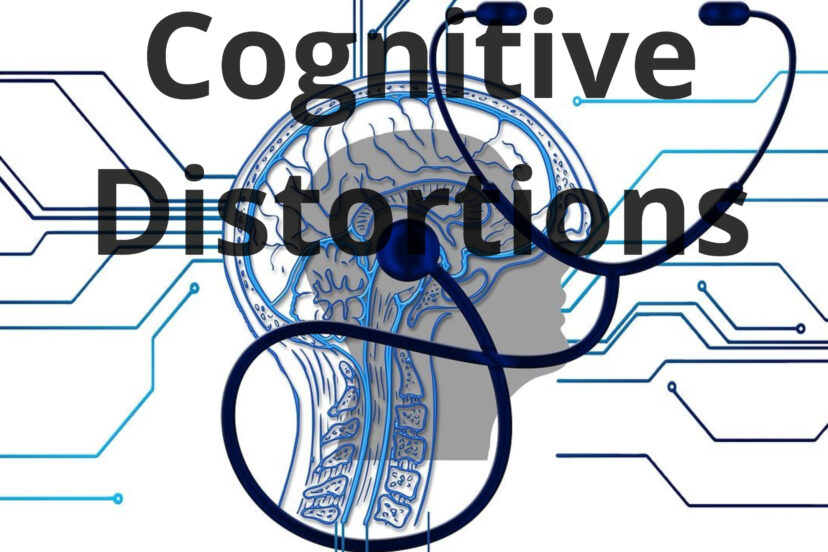Cognitive Distortions

Do you trust your brain? Are there occasions when you question if what you are thinking is right? Is there a better to look at things? Why do I feel about things this way? What affects my thoughts? How do my current circumstances influence the way I look at things?
We know that our brains learn and create connections, so what we learn can stay in our brain as memory and, when needed, be activated. But what if you learn the wrong thing? We then create faulty connections that will affect the way we think, our perspective, our opinions, and our actions.
The current research on how the brain can change and how it can be recreated has made me examine the way I think and the thoughts that I have in my brain. It is because if these questions that lead me to cognitive distortions.
What are Cognitive Distortions?
Cognitive distortions are biased perspectives of ourselves and the world we live in. They are unreasonable thoughts and beliefs that we unconsciously reinforce over time.
These systems and patterns of thought are not prominent, making it difficult to identify them when they have become part of our daily routine of thinking. And that is the challenge. We need to recognize and identify them so we can change them. Build the connections to the right way of thinking and strengthen them; weaken and disconnect the connections for the wrong kind of thinking.
All cognitive distortions are:
- Tendencies or patterns of thinking or believing
- Are false or inaccurate
- Potential to cause psychological damage
16 Most Common Cognitive Distortions
Psychologist Aaron Beck first presented the theory behind cognitive distortions in 1976. Beck developed the basis for CBT (Cognitive Behavioral Therapy) when he observed that many of his patients struggling with depression were operating on false assumptions and distorted thinking, so he hypothesized that if he could change their thinking, he could change the signs and symptoms of depression.
Cognitive Behavioral Therapy is founded on the idea that our thought patterns and deeply held beliefs about us and the world direct our experiences. This can lead to mental health disorders when they are distorted but can be modified or changed to eliminate negative symptoms.
David Burns is another expert on depression and treatment research. He named and gave examples of the distortions in the 1980s.
1. All-or-Nothing Thinking / Polarized Thinking
It is looking at things as either Black and White and do not allow for the gray areas. They are either perfect or a failure, no in-between, no middle ground, no neutrality. You only think and see things in the extremes.
2. Overgeneralization
It is judging a book by its cover. It is the first impression is true and final. Once it happens, it will keep happening. You go through unpleasant events and see life resulting in a lifetime of loss and defeat.
3. Disqualifying the Positive
You recognize the positive experience, but instead of accepting the experience as favorable, you reject them. If somebody gives a positive comment, instead of saying “Thank you”, you may say that they are just saying that because it is the expected thing to do or to avoid confrontation.
4. Mental Filter
It is pessimism and the thinking that everything that is, in reality, is an irony. You choose to see the negative and disregard the positive aspects.
This thinking distortion is particularly harmful because it promotes negative brain connections despite supportive, positive proof.
5. Magnification (Catastrophizing) or Minimization
You always thinking that something terrible will happen no matter what you do, regardless of how well prepared you are. You expect catastrophe to happen regardless. It is endless.” What if?”
6. Jumping to Conclusions – Mind Reading
You assume that you know and understand what other people are thinking, and you jump to your own conclusion.
7. Jumping to Conclusions – Fortune Telling
You make conclusions and predict the future based on what is happening now.
8. Emotional Reasoning
“I feel it; therefore, it must be true.” I am jealous and now think your spouse is cheating on you, but your jealousy doesn’t make your husband is cheating true.
9. Personalization
Taking things personally, blaming yourself, seeing yourself as the black sheep, and the reason for things going wrong.
10. Should Statements
“Should” do, “ought” to do, “must” do applied to ourselves and others. When you say these words, you are imposing a set of expectations on yourself and others. If not met, will lead to frustration, anger, and resentment.
11. Labeling and Mislabeling
You judge the value of someone or something based on a single experience with that someone or something. You categorize someone or something based on one event, which is unfair, inaccurate, and may lead to missing out on someone or something that may be great.
12. Control Fallacies
A control fallacy can be a) that we have no control over our lives. We are helpless victims of fate, or b) that we are in complete control of ourselves and our surroundings, making us solely responsible for everything.
13. Fallacy of Fairness
You believe that this world is fair and judge yourself and experiences through the ruler of fairness. Using the barometer of justice will only lead to frustration, anger, resentment, and hopelessness because of the unrealistic expectation of fairness.
14. Fallacy of Change
You believe that if you change people, you will be happy and prosperous.
15. Always Being Right
You believe that you are always right; you can never be wrong.
16. Heaven’s Reward Fallacy
The belief that if you do good and work hard, you will be rewarded.
Now You Know, So What?
Knowing is the beginning. Now that you know all of these cognitive distortions and recognize that they are universal and potentially damaging. Once identified, we can work on minimizing and overcoming these cognitive distortions from the way we think.
Once we find ourselves in one of these cognitive distortions, we can challenge the distortion and deal with them positively and effectively. We make corrections early so they will not root and create permanent and robust brain connections.
Early correction of these cognitive distortions would also prevent unrealistic expectations, unnecessary frustration, anger, resentment, and hopelessness.
In the next article, we will be discussing the different methods to overcome these cognitive distortions.
Source





Hi!
I know this is kinda off topic but I was wondering which blog platform are you using for this
website? I’m getting sick and tired
of WordPress because I’ve had problems with hackers and I’m
looking at options for another platform. I would be
fantastic if you could point me in the direction of a good platform.
I need to thanks, due to the fact that it’s extremely tough to discover good info like your blog.
I think that what you posted was very logical. But, what about this?
suppose you composed a catchier post title? I am not saying your
content isn’t good., however what if you added a
post title that grabbed folk’s attention? I mean Cognitive Distortions – jodamel is a little plain. You ought to glance at Yahoo’s
front page and note how they create post titles to
get viewers to click. You might add a video or a related pic or two to grab
people interested about what you’ve got to say. In my opinion, it could bring your posts a
little livelier.
This is a really good tip especially to those fresh to the blogosphere. Brief but very accurate information… Thank you for sharing this one. A must read post!|
Article writing is also a excitement, if you be acquainted with afterward you can write if not it is complex to write.|
I think the admin of this site is in fact working hard in support of his web page, as here every material is quality based information.|
Very quickly this web page will be famous amid all blog users, due to it’s fastidious content|
Hi! Do you use Twitter? I’d like to follow you if that would be okay. I’m absolutely enjoying your blog and look forward to new posts.|
I’m really impressed with your writing talents and also with the layout on your weblog. Is that this a paid subject or did you modify it your self? Anyway keep up the excellent high quality writing, it’s uncommon to see a nice weblog like this one nowadays..|
I love what you guys tend to be up too. This kind of clever work and coverage! Keep up the terrific works guys I’ve added you guys to blogroll.|
Appreciate this post. Let me try it out.|
There is certainly a lot to know about this issue. I really like all the points you have made.|
Heya i am for the first time here. I came across this board and I find It really useful & it helped me out a lot. I hope to give something back and help others like you helped me.|
Great goods from you, man. I’ve understand your stuff previous
to and you’re just extremely magnificent.
I actually like what you’ve acquired here, certainly like what you’re saying and the way in which you say it.
You make it enjoyable and you still care for to keep it wise.
I cant wait to read far more from you. This is actually a great web site.
Feel free to surf to my blog post; tracfone special